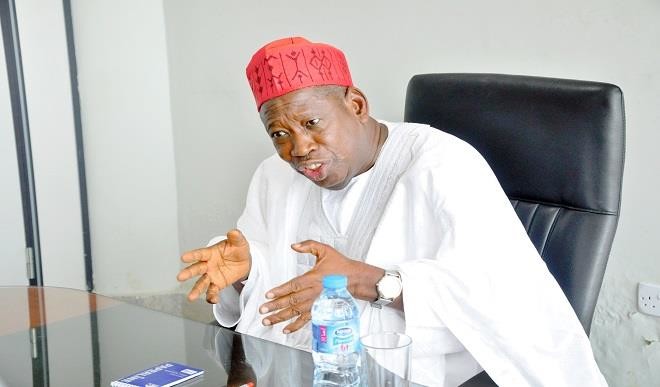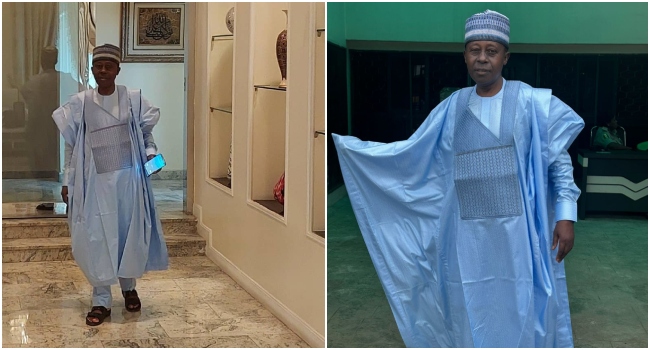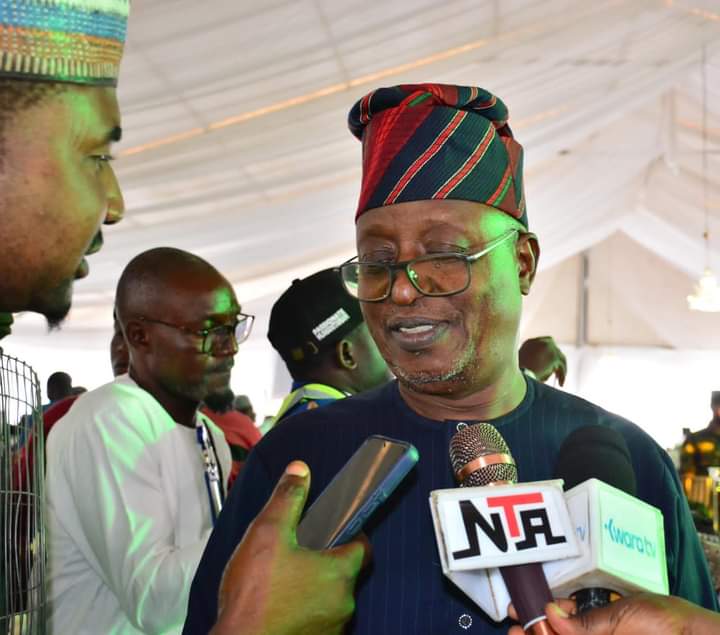- DSS: Judges Got Bribe in Dept Store, Ghana, Niger
More allegations were made yesterday against some judges.
One got a bribe in a department store. Another travelled to Ghana, Niger Republic and Benin Republic to collect bribe, a security source alleged.
It is all in a bid to explain the controversial sting operations in which some judges were arrested at the weekend.
Eight more judicial officers, including one or two justices of the Supreme Court, may soon be invited for questioning as part of the controversial battle to rid the judiciary of corruption, it was learnt.
No fewer than 15 judges are under investigation for alleged corruption.
The outgoing Chief Judge of Enugu State, Justice I. A. Umezulike, has been arrested.
The Department of State Services (DSS) is expecting a Federal High Court ( Port Harcourt) judge, Justice Mohammed Liman, to honour its invitation after a botched attempt to arrest him on Saturday.
It was also learnt that the DSS yesterday exchanged correspondence with the National Judicial Council( NJC) ahead of its meeting today.
But the secret service made “a shocking discovery” on some of the judges under investigation.
The DSS was said to be in possession of audio and video tapes of some of the judges collecting bribe.
While one of the judges just acquired a N1.5billion mansion, another allegedly collected bribe in a department store and one allegedly crossed the borders to Benin Republic, Niger Republic and Ghana to collect money.
A Court of Appeal judge allegedly collected N200million but he was only recommended for retirement and the NJC directed him to refund the cash installmentally.
According to investigation by our correspondent, seven of the 15 judges under probe have been detained by the DSS.
Those detained are two Supreme Court judges-Justices Sylvester Ngwuta and Inyang Okoro; the suspended Presiding Justice of the Court of Appeal, Ilorin Division, Justice Mohammed Ladan Tsamiya, who was picked up in Sokoto; Justice Adeniyi Ademola( Federal High Court); the Chief Judge of Enugu State, Justice I. A. Umezulike; Justice Kabiru Auta of Kano State High Court; and Justice Muazu Pindiga( Gombe State High Court).
A source, who spoke in confidence, said: “I think so far, about seven judges have been detained but altogether 15 judges are under investigations. We still have about eight others already being probed. There may be one or two Supreme Court Justices among the remaining eight.
“The DSS has also invited three registry staff of some courts, who probably played some roles in the bribery saga, for questioning.”
Asked of the welfare of their Lordships, the source said: “We have treated the seven judges in custody with utmost respect, decency, they are not treated like criminals at all. Their interrogation does not last more than two hours and they are given meals of their fancy.
“The judges are being detained. They need to fill some forms. Also, if they had answered our questions, they would have been released under one hour.
“Some of these judges have made statements to our team. We have also shown them some evidence in order to show that the DSS was tidier in in its probe.”
The source, who pleaded not to be named because of the “sensitivity nature of thise probe” gave insights into “curious” findings against some of the judges.
He said: “A Supreme Court Justice has a property worth N1.5billion. If not DSS, which other agency will unravel this? Are you expecting the police to take on these judges?
“Another Supreme Court justice credited everything to his son. If the son started earning a living from the day he was born( assuming he was earning N1million), he cannot be able to earn one quarter of what he is claiming to have.
“We said it is very simple, tell us the business or the work you have done to have been able to earn so much.
“A judge entered a department store not to buy anything but to collect bribe, inside a supermarket from a go-between. Unknown to the judge and the collector, there are cameras in the store. The video clip is there.
“Another judge under probe has perfected the art of being a bribe collector on behalf of others. He is notorious in crossing the borders to Benin Republic, Niger Republic and Ghana. We know some of the hotels where he used to lodge.”
The source went on: “We have the case of a judge who issued bail conditions to an accused person but the conditions were not met and the suspect was released. After the court session, the accused person sent word to the judge that he could not meet the conditions but take this amount to set me free.
“Of course, the judge did not act alone; the court clerk, the bailiff and the Registrar were involved. The DSS knew all that transpired, the amount involved and who took what. When we confronted the Registrar to give us the details of how the bail conditions were met, there was no single evidence.
“The judge in Port Harcourt is under probe for about $2.5million. Out of that amount, $500,000 was moved elsewhere and we know where it went.
“They mobilised thugs because the recovery of the remaining $2million will be a lead that will open a can of worms. That face-off was used to remove the money. We are tracking the money, we already have the idea of where the $2million was hidden. We will get it.
“Governor Nyesom Wike’s fear was that once that money was taken, the judge must account. So, there was need to cover up. The judge exposed himself by bringing Wike into the investigation and he has made his case worse. The question is: Why was Wike at the judge’s house? Is the judge’s house a government house? How can a governor be in that place at that hour?
“The judge gave a ruling on the PDP crisis by legitimising the illegitimate for a purpose.”
On the alleged planting of recovered cash in the judges’ quarters, the source said: “The DSS did not do anything like that. In fact, the judges signed for items recovered from their residences.
“If you crosscheck, the operation was spontaneous and simultaneous in the judges’ quarters. It started between 10.30pm and 11pm on Friday night. It was painstaking and professionally conducted. Technically speaking, the DSS gave the time and the cameras used for the operation were digitalised.
“The search was conducted in the presence of the owners of the houses. There was no molestation, no harassment. We don’t need to plant money in anybody’s house because we have all subscribed to the oath of office. In an era where the government is trying to be fair, we don’t need to do that.
“There was search warrant duly obtained from the court. The execution of a search warrant does not require the presence of a lawyer. Even at that, one of the judges invited his lawyer who examined the warrant and asked him to cooperate with the DSS operatives.”
Responding to a question, the source said: “The DSS is in custody of some audio and video tapes of some of these judges. By the time we start running these tapes, Nigerians will appreciate that we have done a good job.
“The DSS did not just jump into investigation, it received petitions on these judges on how they literally took money. The worst aspect is that they took money with both hands.
“ Some of these things were becoming disturbing and people were bringing facts and figures. We went to verify these. If a judge builds a house, it is easier to discover because he might have bought the land from an individual or an agency or estate agent. There is no way you can cover up all these things.”
Concerning why the DSS stormed the official quarters of the judges, the source added that the poor cooperation of the NJC accounted for it.”
He spoke of how the DSS decided to go through the NJC to invite the judges for investigation “in a less dramatic way”. Correspondences were exchanged between the NJC and the Federal Ministry of Justice for certain information and dossier. The Ministry of Justice complied but the NJC refused, he claimed.
“We wanted to intervene in a less dramatic way. In fact,MIT was our wish, it would have been seamless. But it did not work that way.
“In the last two weeks, the NJC submitted the names of three judges for sanctions. By what the NJC told the press, one of the judges, Justice Mohammed Ladan Tsamiya, only demanded N200million from a litigant, but the DSS discovered that he took the money.
“The NJC asked the Appeal Court Justice to be paying back the N200million instalmentallly. Is that punishment proportionate to the offence? The NJC went ahead to give such a judge soft landing. That in itself is corruption,” the source said, adding:
“Other officers were to be retired. Then, what happens to the proceeds of the crimes committed? How is that action going to stop corruption?
“Notwithstanding, DSS is working with everybody. We are in touch with NJC. Even today, we exchanged correspondence with the NJC. We don’t personalize issues.
“For record purpose, NJC is not a court of law; it is an institutional disciplinary body which ought to collaborate with security and anti-graft agencies.”
The Nigerian Bar Association (NBA) has criticized the arrests, saying the judges should be released. The source faulted the NBA’s reaction, stressing that the cleansing of the Judiciary was not peculiar to Nigeria.
The source said: “I think there is nothing like tension; whoever tries to provoke national insecurity will be dealt with according to the law of the land.
“There is nobody that is above the law. In Ghana, 32 senior judges and over 20 magistrates were sent out if the bench because of corruption. Did the Ghana Bar Association threaten to shut down the courts?”
Asked if the DSS will respect court orders to release the judges when arraigned, the source said: “If it is an order, we will respect the court and release them.”
Pressed to comment on whether or not the accounts of the detained judges have been frozen, the source replied: “I won’t tell you.”


 Naira4 weeks ago
Naira4 weeks ago
 News3 weeks ago
News3 weeks ago
 Education4 weeks ago
Education4 weeks ago
 Social Media4 weeks ago
Social Media4 weeks ago
 Economy4 weeks ago
Economy4 weeks ago
 Investment4 weeks ago
Investment4 weeks ago
 Dividends4 weeks ago
Dividends4 weeks ago
 Business3 weeks ago
Business3 weeks ago




























